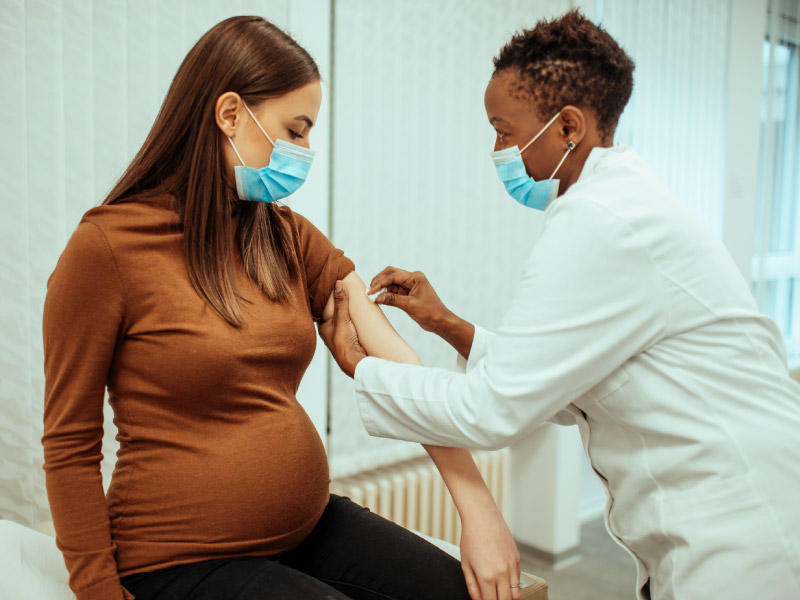What doctors say about pregnancy, vaccines and COVID-19
By Michael Merschel, American Heart Association News

COVID-19 can be bad for anyone. For pregnant women, scientific research shows it can be worse: The disease significantly raises their odds of needing ICU care, giving birth prematurely and of dying.
Vaccines offer protection. But despite reassurances and encouragement from a wide array of health groups, vaccination rates for pregnant women remain stubbornly low. According to the Centers for Disease Control and Prevention, only 31% of pregnant women were vaccinated as of mid-September. The rate was only 25.3% for Hispanic women and 15.6% for Black women.
Doctors who treat COVID-stricken women during pregnancy have confronted old misconceptions and fresh disinformation about vaccines and what's best for mother and child.
"I've heard everything," said Dr. Garima Sharma, director of the cardio-obstetrics program at the Ciccarone Center for Prevention of Cardiovascular Disease at Johns Hopkins Medicine in Baltimore. Some women worry about inaccurately described side effects they've heard about. Others say, "I'm not sure what it's going to do to me, because I don't know the data," or simply, "I don't believe in the vaccine."
Sharma, an assistant professor of medicine who specializes in cardiovascular disease in women and pregnancy, supports vaccination. "There is no evidence of adverse maternal or fetal effects from vaccinating pregnant patients."
Physician groups such as the American College of Obstetricians and Gynecologists and the Society for Maternal-Fetal Medicine agree.
"There is no data at all that the vaccine causes any detrimental effect on the pregnancy," said Dr. Christina Han, an associate clinical professor of obstetrics and gynecology and division director of maternal-fetal medicine at UCLA Health in Los Angeles.
Han, a member of the Society for Maternal-Fetal Medicine's COVID Task Force, can cite several studies supporting COVID-19 vaccination in pregnant women.
One of the most recent, published Sept. 8 as a research letter in JAMA, looked at the records of more than 105,000 pregnancies and found no difference between miscarriage rates for those who got a vaccine and those who didn't.
Extensive monitoring by the CDC has found nothing alarming. "There's been zero red flags on vaccines causing a problem with either the neonate, or the placenta, or the mother," Han said.
Yet the threat COVID-19 poses to the health of a mother and her child is clear.
Han cites CDC data released in November that showed pregnant women who had COVID-19 were more likely to need ICU care or treatment with a heart-lung machine than non-pregnant women who had the disease.
Another 2020 report, from the journal BMJ, concluded that compared to those without COVID-19, pregnant women who have the disease are 18 times more likely to end up in the ICU, nearly three times more likely to die and nearly one and a half times more likely to have a premature delivery.
While the overall risk of COVID-19 to pregnant people is low, Han called the severe cases "heartbreaking" for her and her colleagues.
"It's truly those who get critically ill that weigh on us, because we see this now as a potentially preventable disease," she said. "And despite there being a good solution, we are still seeing women come in who end up that sick."
Pregnant women's concerns about vaccines predate the pandemic, Han said. "There's always a little bit of hesitancy from pregnant individuals to utilize any medication."
Sharma, co-author of a recent American Heart Association policy statement on maternal health, said the particularly low vaccination rate for Black and Hispanic women was in part due to fears about vaccines but also broader issues, such as access to transportation and the internet and information on how to get vaccinated.
"Mistrust in the medical system should also not be understated here," she said.
To fight that mistrust, Sharma said, health care workers need to come up with innovative ways of getting out their lifesaving message. That means working with trusted messengers, such as churches or even door-to-door visits from volunteers. "When it comes from people that are within the community and community health workers, friends and neighbors who have been vaccinated, I think there's a larger acceptance than (when it comes from) those with white coats."
Han said she had been doing outreach to community leaders in California to find ways to address the concerns of groups with vaccine hesitancy. "If we can have true intimate conversations with these community leaders to find out where their hesitations are, and to make them realize exactly the impact on our community, that's probably where it will make a difference."
Sharma also engages in straight talk with her patients, who often have heart conditions, which adds to their risks of complications from COVID-19. If they haven't been vaccinated, she tells them "very clearly" that they are putting themselves and their baby at risk, and that if they have questions, they should ask their obstetrician. "What I have personally seen is that if multiple doctors and clinicians are saying the same thing, then the message gets through."
Han said obstetricians would not keep up the effort if they didn't believe what they were saying. "We gain nothing from every patient that comes on board with vaccines – with the exception of maybe being able to see them through a healthy pregnancy."
Editor's note: This story was updated on Oct. 4 to clarify findings from the BMJ study. Because of the rapidly evolving events surrounding the coronavirus, the facts and advice presented in this story may have changed since publication. Visit Heart.org for the latest coverage, and check with the Centers for Disease Control and Prevention and local health officials for the most recent guidance.
If you have questions or comments about this story, please email [email protected].





